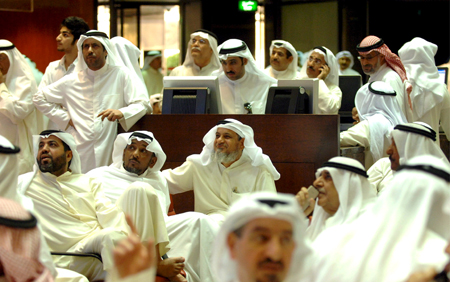The Exchange, A Look at Kuwait’s Newest TV Show on Netflix

By: Mariam Alyakoob / Arab America Contributing Writer
The Exchange, which was released on Netflix on February 8th, differs greatly from most of the Kuwaiti soap operas that have become popular in recent years. It depicts two women in their 30s trying to make it in a male-dominated industry while trying to show their strength and worth in the cutthroat Kuwait stock exchange in the 1980s.
The show was created by Nadia Ahmad and Anne and Adam Sobel; produced by Abdullah Boushahri; and directed by Jasem AlMuhanna and Karim El Shenawy.
The two main characters of the show are Farida and Munira portrayed by Rawan Mahdi and Mona Hussain, respectively.
The Single Mother
Farida is a recent divorcee, having returned to live with her parents. She is struggling financially. Farida was unemployed during her 13 years of marriage and does not even have her own bank account. All the while, she is struggling to pay off her daughter’s private school fees. Farida is inspired by the show’s creator Nadia Ahmad and her mom, who was also a single mother.
Farida has to enroll her daughter into a public school where she endures bullying from her fellow peers who think she is snobby given that she had attended private school beforehand
“She thinks she’s better than everyone ‘cause she went to the British School. She’s just like chicken nuggets from Hungry Bunny: brown on the outside, white on the inside.”
She struggles as a single mother trying to support her daughter and often finds herself the center of unwanted attention from the local community due to her divorce.
The cousin
Munira is a cousin of Farida and is a single, independent, 32 year old woman who works as a clerk for the Kuwait Stock Exchange. Unlike her cousin, she has been able to support herself financially through her job, even affording a very nice car. Munira has a strong personality and is often depicted as stubborn. She is a woman who gets what she wants.
New Beginnings

Farida, following in the footsteps of her cousin, begins working at the cutthroat Kuwait stock exchange as a clerk. The Kuwait stock exchange is filled with men and the cousins are the only women who are employed there.
The women work for the Bank of Tomorrow’s trading division, alongside their male colleagues Hassan and Walid, who continuously degrade their work. The lack of respect given towards women shouldn’t come as a surprise as women in Kuwait weren’t even allowed to vote in the 80s. Their right to vote wasn’t granted until March 2005.
The women are often disrespected and looked down upon by the men who don’t take them seriously, with the one exception being their understanding manager. Many of the men feel as though Munira and Farida do not belong at the stock exchange, with one telling them “And you consider yourself to be a man? Listen, little girl. Never forget that you’re a girl, a woman, which means that I can’t treat you the way I treat men or talk to you the way I talk to the men”. There isn’t even a women’s bathroom located within the stock exchange building, and the women have to cross the street in order to use the bathroom of a local fast food store.
Yes They Can
In time, the men find out that the women are much more intelligent and more capable than they originally thought and are a force to be reckoned with. In many cases, the women are also forced to compete against each other because it is hard for the men to believe that more than one woman would have been able to succeed in the stock exchange. Thus Farida and Munira are pitted against each other.
Hungry Bunny

The show is also filled with many 80s references. One such reference is the characters eating at Hungry Bunny, a very popular Kuwaiti fast food establishment in the 70s and 80s that isn’t as common in modern-day Kuwait. We also see the female characters rocking shoulder pads, which was a defining fashion feature in the 80s, while the men are wearing the traditional dishdashas, which are still worn in Kuwait today.
And since the show takes place in 1987, prior to the Gulf War, we see some of the characters mention the Iraq-Iran war happening north of Kuwait, which took place from 1980 until 1988.
Overall, the Exchange is an empowering show that is an ode to the Kuwaiti women who, similarly to Farida and Munira, had to work hard in the male-dominated workforce in the 1980s. Watch the story unfold on Netflix!
Check out Arab America’s blog here!









